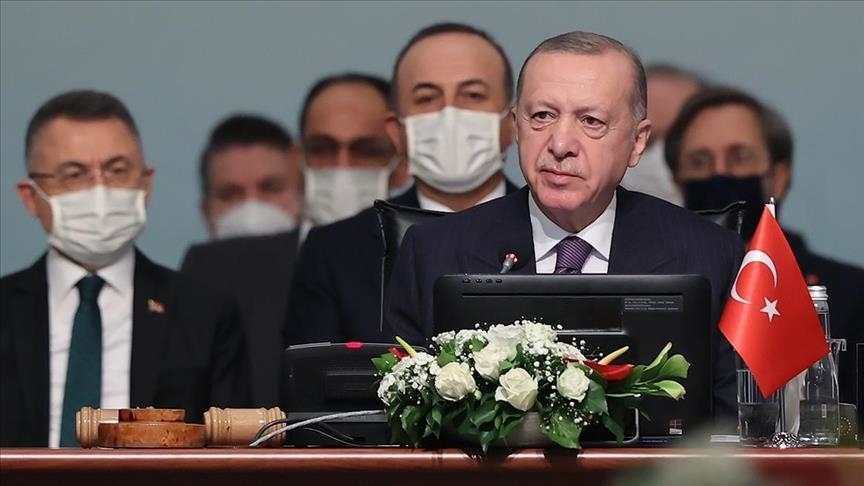ISTANBUL, TURKEY
It is a “great injustice” that the African continent, with its population of 1.3 billion, is not represented at the UN Security Council, Turkey’s president said on Saturday.
Referring to his slogan, “the world is bigger than five,” protesting the unrepresentative setup of the UN Security Council, Recep Tayyip Erdogan said Turkey’s efforts were also meant for its brothers and sisters in Africa, as well, in his speech at the third Turkey-Africa Partnership Summit in the Turkish metropolis Istanbul.
The three-day summit began on Thursday with a meeting of high-level government officials in Istanbul and continued with a meeting of foreign ministers Dec. 17.
Over 100 government ministers and 16 presidents from Africa are attending the summit which is being held under the theme, Enhanced Partnership for Common Development and Prosperity.
“I believe that we need to join forces so that Africa can be represented in the Security Council, as it deserves,” he added.
Underlining that it was disgrace for humanity that only 6% of Africa’s population has been vaccinated against COVID-19, Erdogan noted: “Turkey plans to send 15 million vaccine doses to Africa.”
When Turkey’s domestic vaccine candidate, which it named Turkovac, receives emergency use authorization, Ankara will put it to the service of all humanity, including Africa, he highlighted.
He added that Turkish hospitals across in Somalia, Sudan, and Niger were healing people across the continent.
Trade relations and investments
Noting that the volume of Turkey’s trade with Africa surpassed $25.3 billion last year, Erdogan added that this figure had already reached $30 billion in the first 11 months of 2021.
He said that bilateral trade would first reach $50 billion and then rise further to $75 billion thanks to joint efforts.
Noting that Turkish companies in Africa are providing employment to approximately 25,000 people, he said the country’s contracting firms “have signed 1,686 projects with a total value of up to $78 billion across Africa.”
Erdogan said that investments of Africans in Turkey were also increasing. “Turkey supports these investments of the African diaspora,” he said.
Underlining that cooperation between Turkey and Africa is based on mutual benefit, he stressed that Ankara rejects “clumsy and orientalist” views regarding the continent.
Increasing relations
Cooperation in other fields has also been on the rise, Erdogan highlighted, with 43 Turkish embassies currently serving in Africa — up from 12 in 2005.
The number of African embassies in the capital Ankara also rose to 37 from 10, he added.
“We expanded our presence across the continent with our institutions such as TIKA (Turkish Cooperation and Coordination Agency), Yunus Emre Institute, Maarif Foundation, Anadolu Agency, Turkish Airlines, and Red Crescent,” he said.
He also stressed that Turkey’s flag carrier Turkish Airlines helps connect the continent and the world, and added that after the pandemic, it would likely boost its flights with Africa.
Saying that Turkey opened its largest diplomatic representation in Somalia, he the Turkish president noted: “In 2011, with my wife, I visited Somalia, where the international community has closed their eyes to the plight of millions of people.”
“We tried to draw the attention of the world to the humanitarian crisis in this brotherly country.”
This visit changed the fate of not only Somalia, which is described as a ‘collapsed state’ by some, but also of East Africa.
“Together, we showed the world that a people can be reborn from the ashes when the necessary support is given and sincere efforts are made.”
Solidarity against terror
Turkey’s first priority should be institutionalizing, deepening, and diversifying relations with Africa, Erdogan highlighted.
Mentioning the security issues present on the continent, he said that, as a country that has been fighting separatist terrorism for nearly 40 years, Turkey is well aware of the security challenges Africa faces.
Organizations such as Boko Haram, Al-Shabaab, and DAESH(/ISIS) are not just a problem for a few countries. They are the common enemy of everyone,” he said.
“There is no distinction between FETO and the PKK and these terrorist organizations that take the lives of innocent Africans,” he added.
The Fetullah Terrorist Organization (FETO) and its US-based leader Fetullah Gulen orchestrated the defeated coup of July 15, 2016 in Turkey, which left 251 people killed and nearly 2,200 injured.
Ankara accuses FETO of being behind a long-running campaign to overthrow the state through the infiltration of Turkish institutions, particularly the military, police, and judiciary.
FETO has a considerable presence outside Turkey, including private educational institutions that serve as a revenue stream for the terrorist.
In its more than 35-year terror campaign against Turkey, the PKK — listed as a terrorist organization by Turkey, the US, and EU — has been responsible for the deaths of over 40,000 people, including women, children, and infants.
“We are ready to offer Turkey’s advanced-technology defense industry products and the experience gained in the fight against terrorism to the benefit of our African friends,” said Erdogan.
He also expressed his thanks to African countries that supported Turkey’s fight against FETO by banning the activities of the organization and closing or transferring its educational institutions to Turkey’s Maarif Foundation.

